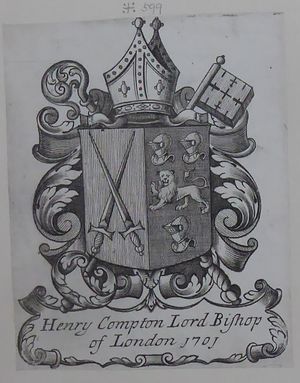Henry Compton 1631/2-1715
Henry COMPTON 1631/2-1713
Biographical Note
Born at Compton Wynyates, Warwickshire, youngest son of Spencer Compton, 2nd Earl of Northampton. His father’s royalist allegiance and death at the Battle of Hopton Hill (1643) led to a period of uncertainty and financial difficulty for the family, but in 1654 Compton matriculated at Queen’s College, Oxford, after spending some time travelling abroad. He did not graduate and travelled further on the continent during the late 1650s. He had a brief military career in the early 1660s before entering Christ Church, Oxford as a canon commoner in 1666 where he was made an MA, and ordained. He was appointed Master of St Cross Hospital, Winchester in 1667, subdean of Christ Church 1669, and given several parochial benefices. With the patronage of the Earl of Danby, he was made Bishop of Oxford in 1674, and translated to London in 1675.
Compton became a diligent and effective administrator in his diocese, and exercised significant influence in the shaping of ecclesiastical policy at court. He was a strong supporter of the established church, hostile to Roman Catholicism; in 1676 he organised a national census of religious adherences to demonstrate the minority of nonconformists. Clashes with James II led to his suspension as Bishop of London in 1686. He was reinstated in 1688 but was by then a signatory to the letter of invitation to support William III’s invasion. He saw some return to favour under William and Mary but was not, as he hoped, made Archbishop of Canterbury.
Books
Compton was noted as having a significant library which he bequeathed in three parts. To Sion College (where he held a visitation in 1695) he left his commentaries on the Old and New Testaments, together with “such other books as I intend to mention in a schedule”. His “divinity and philosophical books” were left to St Paul’s Cathedral Library, and “grammatical and philological books” were given to Colchester Free School.
A quantity of duplicates were sold from the gift to Sion College, raising £36. The bequest to St Paul’s amounted to ca.1900 volumes. According to an early 19th-century history of Colchester, it was decided that the books intended for the School there would not be sufficiently useful to justify the cost of transport, so these were sold in London. Dispersals over time mean that books from Compton’s collection are now found in many libraries. Examples: many in St Paul’s Cathedral Library; Shrewsbury School P.IV.15, P.IV.26; Lambeth Palace Library (Sion College A26.25/V53).
In 1685 Edmund Castell bequeathed to Compton all his printed Bibles, including oriental versions. Compton gave most of these books to Sion College in 1707 (those remaining becoming part of his later bequest).
Characteristic Markings
Compton used an engraved bookplate with his arms as Bishop of London, dated 1701 (Franks 6576/*599).
Sources
- Coleby, Andrew M. '"Compton, Henry (1631/2–1713), bishop of London."' Oxford Dictionary of National Biography.
- Cromwell, T., History and description of … Colchester, 1825.
- Gambier Howe, E. R. J. Franks bequest: catalogue of British and American book plates bequeathed to the ... British Museum. London, 1903.
- Lee, B. N., British bookplates, Newton Abbot, 1979, no.31.
- Pearce, E. H., Sion College and Library, 1913.
- Sparrow Simpson, W., St Paul’s Cathedral Library: a catalogue, 1893.
- Inscription of Henry Compton in Sion College Library.
